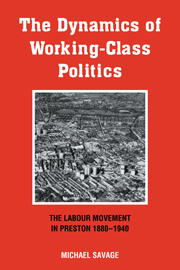Book contents
- Frontmatter
- Contents
- List of tables, maps and figures
- Preface
- Acknowledgements
- 1 Political practices and the social structure
- 2 The diversity of working-class politics
- 3 The local bases of practical politics
- 4 Labour market structure in Preston, 1880–1940
- 5 Urban structure and associational practices
- 6 The emergence of independent Labour politics, 1880–1914
- 7 The transformation of the Labour party, 1914–40
- 8 Conclusions
- Appendices
- Notes
- Bibliography
- Author index
- Subject index
3 - The local bases of practical politics
Published online by Cambridge University Press: 05 November 2011
- Frontmatter
- Contents
- List of tables, maps and figures
- Preface
- Acknowledgements
- 1 Political practices and the social structure
- 2 The diversity of working-class politics
- 3 The local bases of practical politics
- 4 Labour market structure in Preston, 1880–1940
- 5 Urban structure and associational practices
- 6 The emergence of independent Labour politics, 1880–1914
- 7 The transformation of the Labour party, 1914–40
- 8 Conclusions
- Appendices
- Notes
- Bibliography
- Author index
- Subject index
Summary
I have argued that practical working-class struggle can best be conceptualised as based around attempts to reduce insecurity through the de-commodification of labour. Which class one belongs to does not, however, entirely determine the type of struggle in which one engages. In order to explain which struggle ensues it is necessary to focus on how workers draw on resources and capacities to generate particular forms of struggle. These capacities in some way bond individuals together, so that they are less likely to consider actions from the point of view of their own immediate interests and more likely to act as a group. In this chapter I shall discuss the most significant types of these and indicate how they tend to facilitate collective action, and to lead to one or other of the types of struggle discussed above.
How are these capacities to be conceptualised? Lash and Urry have argued that people can draw on two main types of resource to sustain collective action. Firstly there are cultural resources, which refer to particular conceptions of justice and languages of opposition (in C. Tilly's words). Lash has argued that these considerations may explain differences in worker militancy between France and the USA. Since I have already drawn attention to the problems of deriving particular political forms from abstract belief systems, however, this argument does not appear helpful for our purposes.
- Type
- Chapter
- Information
- The Dynamics of Working-class PoliticsThe Labour Movement in Preston, 1880–1940, pp. 39 - 63Publisher: Cambridge University PressPrint publication year: 1988



